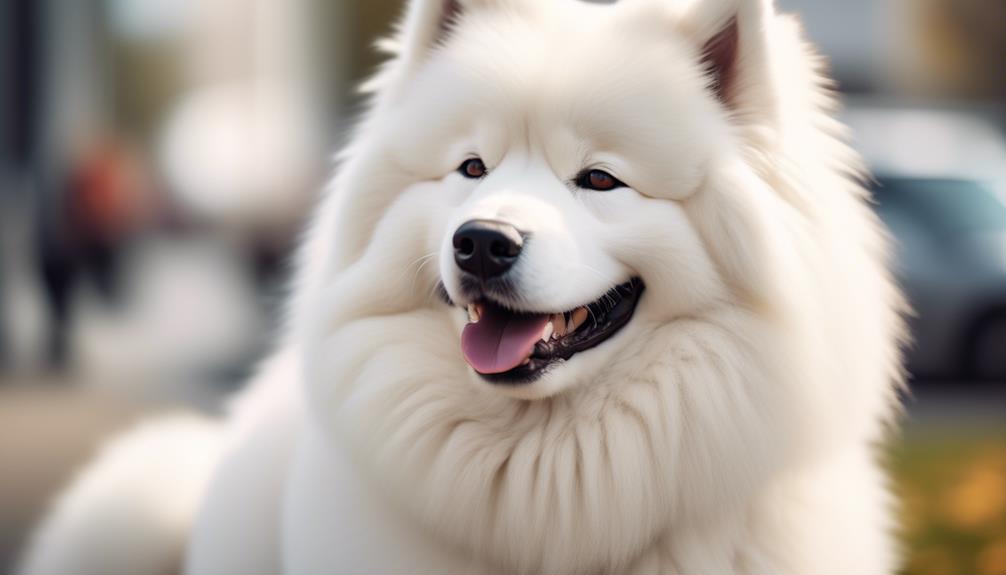
In the vast world of dog breeds, there is one that stands out like a beacon of warmth and charm, capturing the hearts of many. With its distinctive appearance and endearing personality, the Samoyed has become a beloved companion for countless families.
But what makes this breed so special? What are the unique characteristics that set them apart from the rest? Well, dear reader, prepare to be captivated as we embark on a fascinating journey into the world of Samoyed dog breed information and characteristics.
From their origins in Siberia to their role in film promotion and exploration, we will uncover the secrets that make Samoyeds a truly remarkable canine companion.
Key Takeaways
- Samoyeds are medium-sized dogs with a thick, double coat in various colors.
- They have a friendly and gentle temperament, and are devoted to their families.
- Samoyeds are relatively easy to train, but can be stubborn, so positive reinforcement is recommended.
- They require daily exercise, a lot of grooming, and are sensitive to heat. They thrive in a large, securely fenced yard and need proper socialization and mental stimulation.
Origin and Size
The Samoyed dog breed, named after the Samoyede people of Siberia, originated in the Arctic region and is known for its medium size. Males stand 21 to 23.5 inches tall, while females stand 19 to 21 inches tall. Both males and females weigh between 50 and 60 pounds.
This breed falls under the classification of Working dogs and has a lifespan of 12 to 15 years. Samoyeds have a thick, double coat that comes in various colors. They’re friendly and gentle in temperament, making them devoted to their families. While not typically aggressive, they can be wary of strangers.
Samoyeds require 30 to 60 minutes of exercise per day and need a lot of grooming, especially during shedding season. They’re sensitive to heat and aren’t suited for apartment or condo living. Proper socialization, mental stimulation, and ongoing training are essential for their overall well-being.
See another Dog breed profile.
Samusky Mixed Dog Breed
Breed Group and Lifespan
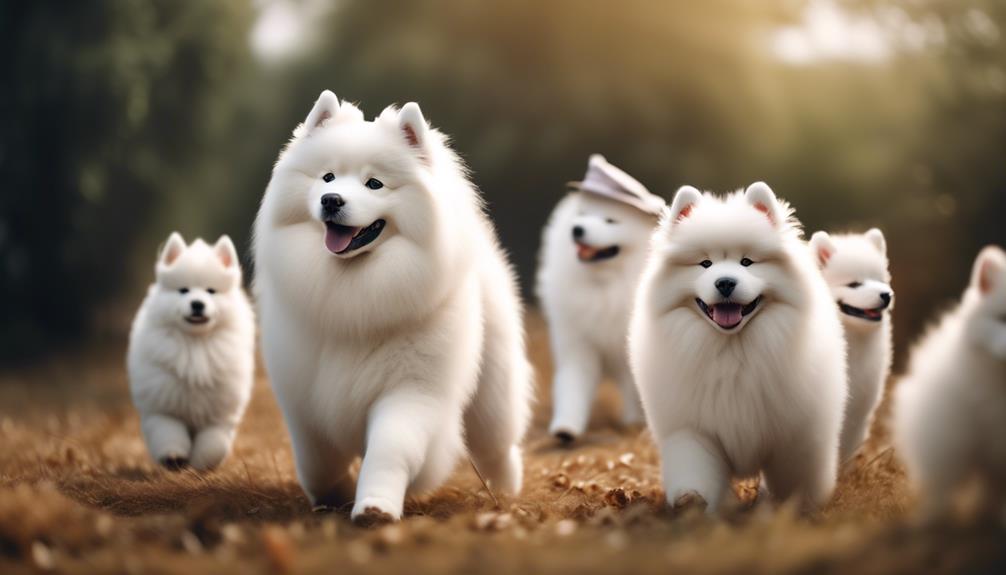
Classified as Working dogs, Samoyeds have a lifespan of 12 to 15 years. These medium-sized dogs are known for their friendly and gentle temperament, making them great companions. They are devoted to their families and thrive on being part of household activities. Samoyeds are intelligent and loyal, making them excellent watchdogs. However, they can be wary of strangers and may require proper socialization. In terms of grooming, Samoyeds have a thick, double coat that needs regular maintenance, especially during shedding season. They also require 30 to 60 minutes of exercise per day to keep them physically and mentally stimulated. With their loyalty, affection, and alertness, Samoyeds make wonderful additions to any family.
| Breed Group | Lifespan |
|---|---|
| Working | 12-15 years |
Coat Characteristics
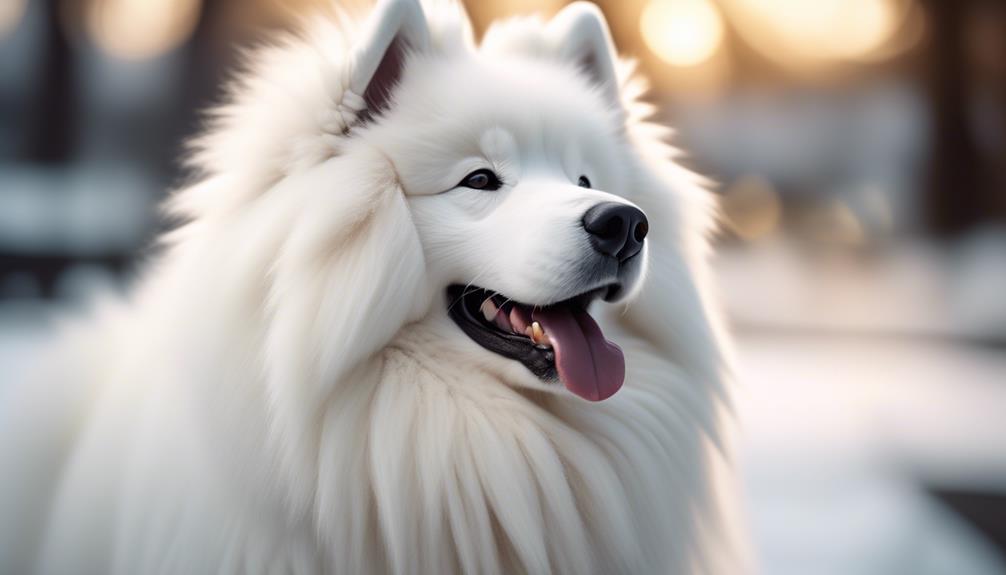
Moving on to the next aspect of Samoyed dogs, let’s now explore their distinctive coat characteristics. Samoyeds have a thick, double coat that serves as protection against harsh weather conditions.
Here are some key points about their coat:
- The outer coat is long, coarse, and straight, while the undercoat is dense and soft.
- The coat comes in various colors, including white, cream, biscuit, and white with biscuit markings.
- Samoyeds shed heavily twice a year, known as ‘blowing coat,’ and regular grooming is necessary to keep their coat clean and free of mats.
The Samoyed’s coat isn’t only beautiful but also functional, providing insulation in cold climates and keeping them comfortable in various weather conditions. Regular brushing and maintenance are essential to keep their coat healthy and looking its best.
Temperament and Training
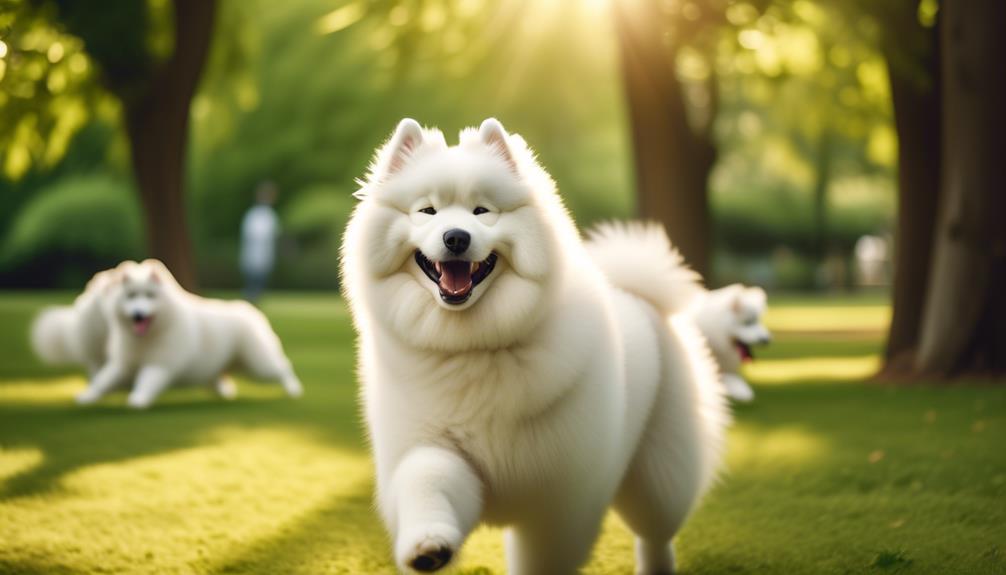
Samoyeds are known for their friendly and gentle temperament, making them a beloved choice for families. They’re devoted to their families and aren’t typically aggressive, although they can be wary of strangers.
When it comes to training, Samoyeds are relatively easy to train, but they can also be stubborn at times. Positive reinforcement is the best approach for training these dogs.
Samoyeds require 30 to 60 minutes of exercise per day to keep them happy and healthy. Additionally, they need a lot of grooming, especially during shedding season. It’s important to note that Samoyeds are sensitive to heat, so high-level activity should be limited in extreme heat.
Due to their need for exercise and mental stimulation, they aren’t suited for apartment or condo living. Proper socialization and exposure to different experiences are also important for their overall well-being.
Exercise and Grooming Needs
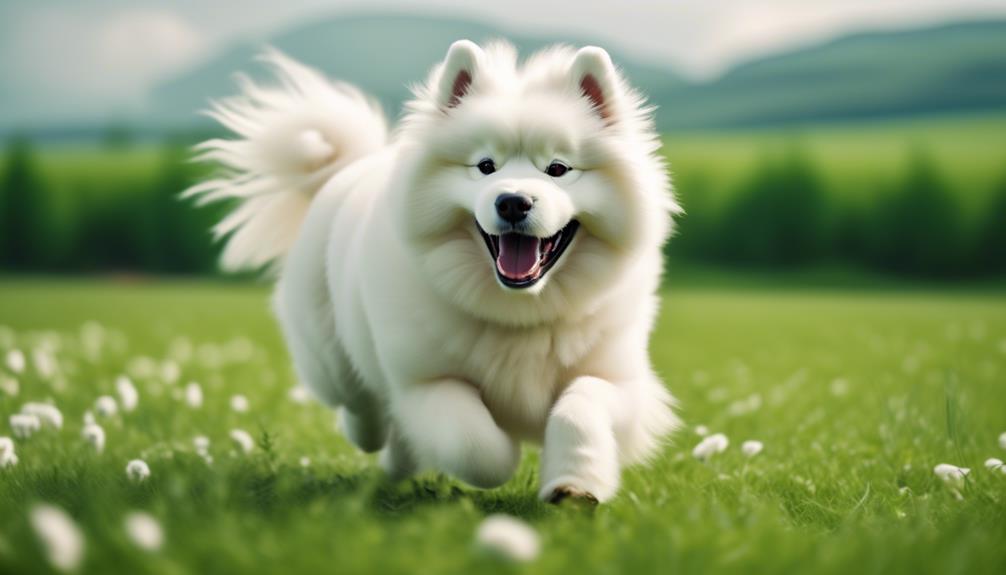
After addressing their temperament and training needs, it’s important to consider the exercise and grooming requirements of Samoyed dogs. Samoyeds are an active breed that needs regular exercise to maintain their physical and mental well-being. Here are some key points to remember:
- Samoyeds require at least 30 to 60 minutes of exercise per day to prevent boredom and keep them healthy.
- They thrive in environments where they’ve ample space to run and play, so a large, securely fenced yard is ideal.
Regular grooming is essential for Samoyeds due to their thick, double coat. They shed heavily twice a year and will require more frequent brushing during these periods to prevent mats and tangles.
History and Significance
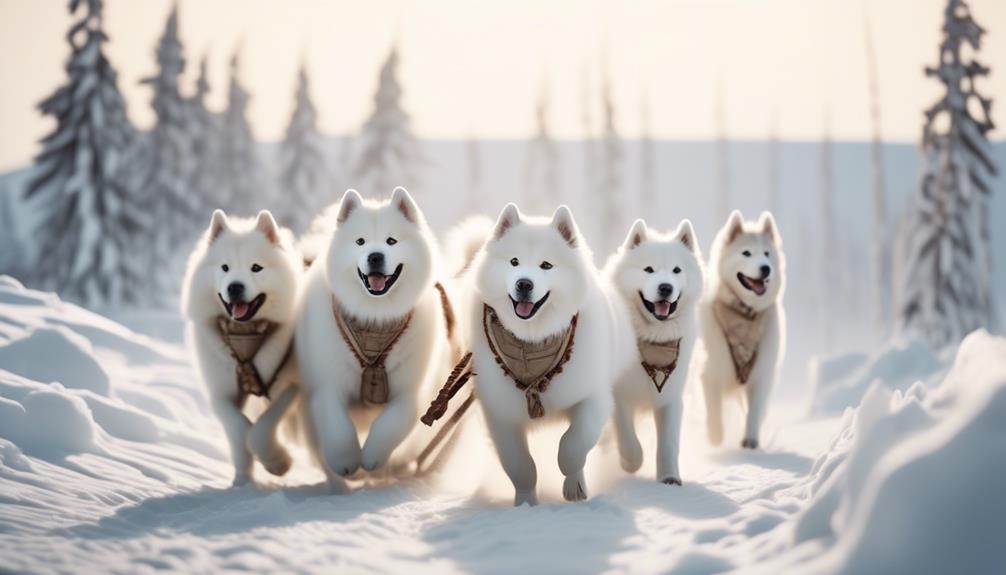
During their rich history, Samoyed dogs have played a significant role in exploration and film promotion.
In 1911, a group of Samoyeds led an expedition to the South Pole, chosen for their ability to navigate harsh conditions. Their strength and resilience made them ideal companions for such treacherous journeys.
Additionally, in 2014, two Samoyeds captured the hearts of filmgoers at Sundance, resulting in the documentary Alive Inside winning the Hulu Best Promotion Sundance Award. These dogs have a natural charm and charisma that translates well on the big screen, making them perfect ambassadors for promoting films.
Whether it’s braving the icy terrains or captivating audiences with their on-screen presence, the Samoyed’s history and significance can’t be overlooked.
Health and Care Requirements
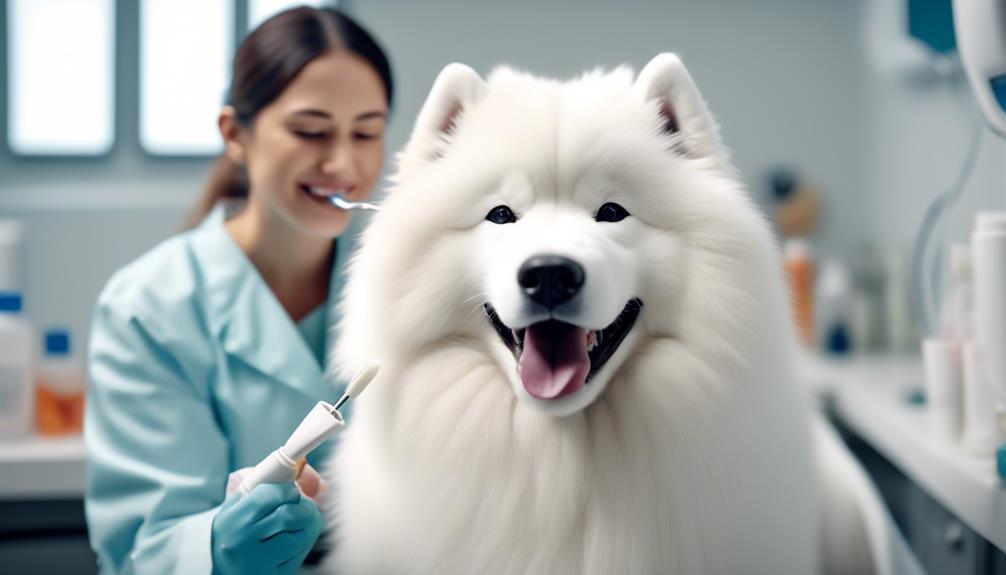
The wellbeing and maintenance of Samoyed dogs require careful attention to their health and care requirements. These fluffy and friendly dogs are prone to certain health conditions, including glaucoma, hip dysplasia, Samoyed hereditary glomerulopathy, patellar luxation, and hypothyroidism.
To ensure their health and happiness, Samoyeds need a large, securely fenced yard to roam and play in. They’re also sensitive to heat, so high-level activity should be limited in extreme temperatures.
Proper socialization and exposure to different experiences are crucial for their overall well-being. Additionally, providing them with the recommended daily amount of food and following feeding guidelines will help maintain a healthy weight and prevent obesity.
Frequently Asked Questions
How Much Exercise Does a Samoyed Puppy Need?
A Samoyed puppy needs 30 to 60 minutes of exercise per day. They are an active breed and require regular physical activity to stay healthy and happy.
Are Samoyeds Good With Children and Other Pets?
Yes, Samoyeds are generally good with children and other pets. They have a friendly and gentle temperament, and they are known to be devoted to their families. Proper socialization is important for positive interactions.
Can Samoyeds Be Left Alone for Long Periods of Time?
Yes, Samoyeds can be left alone for long periods of time, but it’s not recommended. They are social dogs and thrive on human companionship. Leaving them alone for extended periods can lead to separation anxiety and destructive behavior.
Are Samoyeds Prone to Excessive Barking?
Samoyeds are not typically prone to excessive barking. However, like any dog, individual temperament and training play a significant role. Proper socialization, mental stimulation, and ongoing training can help minimize any potential barking behavior.
Do Samoyeds Have a Strong Prey Drive?
Yes, Samoyeds have a strong prey drive. They are known to chase small animals, including squirrels and cats, due to their instinct to hunt. Proper training and socialization can help manage this behavior.
Conclusion
In conclusion, the Samoyed dog breed is a friendly and gentle working dog known for its thick, double coat and strong devotion to its family.
Despite their stubbornness at times, they’re relatively easy to train with positive reinforcement.
Samoyeds require daily exercise and extensive grooming, and aren’t suitable for hot climates or apartment living.
With their intelligence, loyalty, and affectionate nature, Samoyeds make wonderful companions for those willing to meet their needs.




